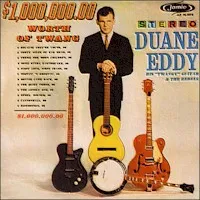Bitrate: MP3@320K/s
Time: 52:49
Size: 120.9 MB
Styles: Assorted Jazz styles
Year: 1998
Art: Front
[8:14] 1. Barney Wilen - Mack The Knife
[6:34] 2. Pharoah Sanders - In A Sentimental Mood
[5:24] 3. Lee Konitz - My Funny Valentine
[6:22] 4. Eddie Harris - Georgia On My Mind
[5:56] 5. Carmen Leggio - Street Of Dreams
[7:03] 6. Archie Shepp - The Thrill Is Gone
[6:44] 7. Phil Woods - Souvenir
[6:28] 8. Barney Wilen - I Cover The Waterfront
About the song 'Mack the Knife": "Mack the Knife" was composed on a whim by Bertolt Brecht and Kurt Weill while they were putting the finishing touches on Die Dreigroschenoper in 1928. As the story goes, the diva-esque tenor who was playing the part of Mackie Messer, aka Macheath or Mack the Knife, suggested that a whole song should be written to introduce his character before he comes on stage. As one columnist recently wrote, "the essence of the song is: Oh, look who's coming onstage, it's Mack the Knife - a thief, murderer, arsonist, and rapist." The song, which became the opening number, was composed in less than 24 hours and added to the show at the final hour. Little did Weill and Brecht know it would be one of their most well-known legacies.
In some ways, The Threepenny Opera, tagged by Brecht and Weill as a show "by and for beggars," revolutionized musical theater. Die Dreigroschenoper was revolutionary because it was a fun musical that doubled as biting satire, throwing stone after stone at the corruption of the German government and its supporters without naming any names. It also integrated contemporary trends like tango and foxtrot. It was also historically fascinating because it was actually a re-write of a musical composed a full two hundred years before, John Gay's Beggar's Opera. In the early 1700s, the Beggar's Opera—which poked light fun at London's bourgeois classes—became wildly popular as the first comic opera. The parody, which featured a Robin Hood-type Macheath who stole from the rich, was later popular in the British colonies in New York and was supposedly enjoyed by George Washington. The Beggar's Opera was translated into German and became a popular play in 1920s Berlin because it spoke to the excesses of post-World War I Germany.
Not surprisingly, Brecht and Weill were pushed out of Germany by the Nazis in 1933, and their works were banned. They both ended up in the U.S. after seeking refuge in several European countries. Given that his life as a writer was devoted to calling out corruption and that he spent about a decade hiding from the Nazis, it is ironic that Brecht, who emigrated to the U.S. in the 1940s, was called before the House Un-American Activities Committee in 1947 and fled the U.S. for fear of political persecution.
Brecht and Weill's interpretation of the John Gay play is more sinister and intense than the amusing Robin Hood themes that showed up in the original. Macheath, the show's anti-hero, goes from being a bit of a crook to being a pretty serious one: he is portrayed as a murderer, rapist, and arsonist who is openly frightening but butters up the people around him, especially women, to keep on their good side. In The Threepenny Opera, he is known as Mackie Messer (Messer is German for knife).
Mack The Knife










